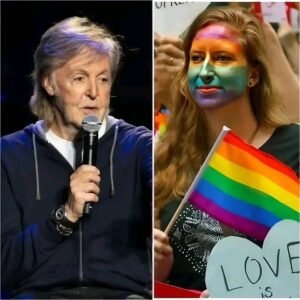The recent alleged statement by Paul McCartney, where he reportedly called Pride Month a “WOKE parade” and declared that music should remain apolitical, has ignited a firestorm across social media and among fans of the former Beatle. According to sources circulating on platforms like X, McCartney’s comments were made during a private interview that quickly leaked, sparking intense debate about the role of artists in political and social movements. The statement, if true, marks a significant departure from the music icon’s historically progressive public persona, leaving fans and critics grappling with its implications. While some applaud his stance for advocating artistic neutrality, others view it as a betrayal of the inclusive values he once championed. The lack of an official confirmation from McCartney or his team has only fueled speculation and polarized reactions.

Supporters of McCartney’s alleged remarks argue that he is defending the purity of music as an art form, free from the weight of political agendas. On X, posts from users like @MusicFirst2025 and @ClassicRockFan88 praise him for “calling out the performative nonsense” of corporate-backed social movements, claiming that Pride Month has been co-opted into a commercial spectacle. They argue that McCartney, as a cultural figure who has long navigated fame, is uniquely positioned to critique what they see as virtue-signaling in the entertainment industry. These fans point to his history of writing universally resonant songs like “Let It Be” and “Hey Jude” as evidence that music can transcend divisive issues, fostering unity without needing to align with specific causes.
Conversely, McCartney’s critics are quick to highlight the irony of his alleged comments, given his past advocacy for peace, love, and social change. During the Beatles’ era, songs like “Blackbird” were interpreted as subtle nods to the Civil Rights Movement, and McCartney himself has spoken about the band’s alignment with progressive ideals in the 1960s. Users on X, such as @PrideVoice21 and @EqualRightsNow, have expressed disappointment, accusing him of turning his back on marginalized communities. Some argue that his dismissal of Pride Month as a “WOKE parade” trivializes the struggles of the LGBTQ+ community, particularly in a time when their rights are under scrutiny globally. These fans feel that McCartney’s influence could have been used to uplift rather than critique a movement rooted in equality.
The controversy has also reignited broader discussions about whether artists can or should remain apolitical in today’s hyper-polarized climate. Music has long been a vehicle for social commentary, from Bob Dylan’s protest anthems to Beyoncé’s celebrations of Black identity. Critics of McCartney’s stance argue that art and politics are inherently intertwined, especially when issues like Pride Month address fundamental human rights. On the other hand, defenders of his alleged position point to the risk of artists being pressured into performative activism, where public statements feel more like branding than genuine conviction. This tension is evident in posts on X, where users debate whether McCartney is bravely resisting “woke culture” or simply out of touch with modern sensibilities.
The absence of a verified statement from McCartney himself has complicated the narrative, with some questioning whether the quotes were taken out of context or fabricated entirely. Misinformation spreads rapidly in the digital age, and X posts from accounts like @TruthSeekerX25 have suggested the story might be exaggerated to generate clicks and outrage. Without a direct response from McCartney’s camp, fans are left to parse secondhand reports and social media snippets, which often amplify division. This uncertainty underscores the challenges of navigating celebrity controversies in an era where unverified claims can dominate public discourse within hours.
As the debate rages on, McCartney’s legacy hangs in the balance. For some, his alleged comments are a bold stand against the politicization of art; for others, they signal a disconnect from the evolving cultural landscape. Regardless of where one stands, the controversy highlights the fraught intersection of fame, personal belief, and public expectation. Until McCartney clarifies his position, the uproar is unlikely to subside, leaving fans to wrestle with whether their idol’s words align with the spirit of a man who once sang, “All you need is love.”